
Lauritz Melchior was a Danish-American opera singer. He was the preeminent Wagnerian heldentenor of the 1920s, 1930s, and 1940s and has come to be considered the quintessence of his voice type. Late in his career, Melchior appeared in movie musicals and on radio and television. He also made numerous recordings.
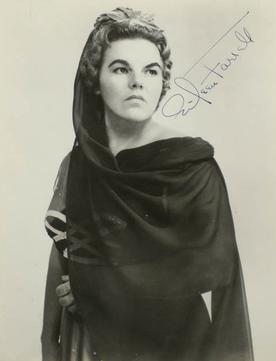
Eileen Farrell was an American soprano who had a nearly 60-year-long career performing both classical and popular music in concerts, theatres, on radio and television, and on disc. NPR noted, "She possessed one of the largest and most radiant operatic voices of the 20th century." While she was active as an opera singer, her concert engagements far outnumbered her theatrical appearances. Her career was mainly based in the United States, although she did perform internationally. The Daily Telegraph stated that she "was one of the finest American sopranos of the 20th century; she had a voice of magnificent proportions which she used with both acumen and artistry in a wide variety of roles." And described as having a voice "like some unparalleled phenomenon of nature. She is to singers what Niagara is to waterfalls."
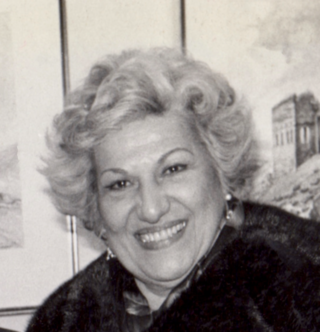
Lili Chookasian was an American contralto of Armenian ethnicity, who appeared with many of the world's major symphony orchestras and opera houses. She began her career in the 1940s as a concert singer but did not draw wider acclaim until she began singing opera in her late thirties. She arose as one of the world's leading contraltos during the 1960s and 1970s, and notably had a long and celebrated career at the Metropolitan Opera in New York City from 1962 through 1986. She was admired for her sonorous, focused tone as well as her excellent musicianship. She often chose, against tradition, to sing oratorios from memory.

Marianne Brandt was an Austrian operatic singer with an international reputation.

Louise Beatty Homer was an American operatic dramatic contralto who had an active international career in concert halls and opera houses from 1895 until her retirement in 1932.

An Old Folks Concert was a form of musical and visual entertainment at which early American compositions by such composers as William Billings and Daniel Read were sung in period costume, while demonstrating early singing school methods. Old Folks Concerts began in the early 1850s in New England, spread in popularity throughout the United States by the 1860s, and continued to be performed into the 20th century. They are especially associated with Robert "Father" Kemp, who formed a traveling troupe to perform this music, and who published a collection of music known as Father Kemp's Old Folks' Concert Music.
Eunice Alberts (1927–2012) was an American contralto who had an active career as a concert soloist and opera singer during the 1950s through the 1980s.

Karl Johann Franz Formes, also called Charles John Formes, was a German bass opera and oratorio singer who had a long international career especially in Germany, London and New York. At one time extremely famous and in the forefront of his profession, several roles were composed for his voice, most notably that of Plunkett in Flotow's opera Martha.
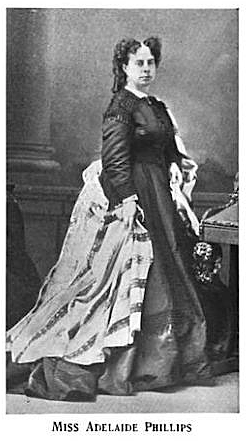
Adelaide Phillipps was an Anglo-American opera singer and actress who became one of America's most admired contraltos of the Victorian era.
Florence Kirk was an American dramatic soprano who had an active international performance career in operas and concerts from 1937 to 1954. Born in Philadelphia and trained at the Curtis Institute of Music by Elisabeth Schumann, she was particularly associated with the roles of Donna Anna in Mozart's Don Giovanni and the title heroine in Verdi's Aida. Her repertoire included other Verdi heroines like Leonora and Lady Macbeth, Santuzza from Mascagni's Cavalleria rusticana, Minnie in Puccini's La fanciulla del West and the title role in Tosca, and several roles from Richard Wagner's Ring Cycle.

Myrna Docia Sharlow was an American soprano who had an active performance career in operas and concerts during the 1910s through the 1930s. She began her career in 1912 with the Boston Opera Company and became one of Chicago's more active sopranos from 1915–1920, and again in 1923–1924 and 1926–1927. She sang with several other important American opera companies during her career, including one season at the Metropolitan Opera. She made only a handful of opera appearances in Europe during her career, most notably singing in the English premiere of Riccardo Zandonai's Francesca da Rimini at Covent Garden in 1914. Her repertoire spanned a wide range from leading dramatic soprano roles to lighter lyric soprano fair and comprimario parts. She even performed a few roles traditionally sung by mezzo-sopranos or contraltos.
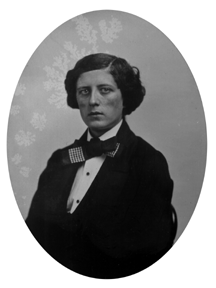
Felicita Vestvali was an opera singer and actress famous in Europe and the United States.

Jennie Lee was a Victorian Era English stage actress, singer and dancer whose career was largely entwined with the title role in Jo, a melodrama her husband, John Pringle Burnett, wove around a relatively minor character from the Charles Dickens novel, Bleak House. She made her stage debut in London at an early age and found success in New York and San Francisco not long afterwards. Lee may have first starred in Jo around 1874 during her tenure at San Francisco's California Theatre, but her real success came with the play's London debut on 22 February 1876 at the Globe Theatre in Newcastle Street. Jo ran for many months at the Globe and other London venues before embarking for several seasons on tours of the British Isles, a return to North America, tours of Australia and New Zealand and later revivals in Britain. Reduced circumstances over her final years forced Lee to seek assistance from an actor's pension fund subsidised in part by proceeds from Royal Command Performances.

Vera Michelena was an American actress, contralto prima donna and dancer who appeared in light opera, musical comedy, vaudeville and silent film. She was perhaps best remembered for her starring roles in the musicals The Princess Chic, Flo Flo and The Waltz Dream, her rendition of the vampire dance in the musical Take It from Me and as a Ziegfeld Follies performer.

Marion Weed was an internationally famous American opera singer with lead roles in the Metropolitan Opera, the Cologne Opera, and the Hamburg Opera. She was the Dean of Women and a Dramatic Instructor at the University of Rochester's Eastman School of Music.

Katherine Spencer Bloodgood Kipp was an American contralto singer and vaudeville performer.

Marie Eugenia von Elsner, known by her stage name Marie Litta, was an American soprano opera singer.

Jean Tennyson, also known by her married names Jean Tennyson Dreyfus and Jean Tennyson Boissevain, was an American soprano, musical theatre actress, philanthropist, and radio personality. She began her career performing in musicals and cabaret shows in Chicago; making her stage debut in 1919. She made her Broadway debut in the chorus of Albert Von Tilzer's 1923 musical Adrienne; ultimately taking over the title role four months into the shows run and performing that part on tour in 1924. After starring in the Broadway musical revue The Earl Carroll Vanities in 1928 and 1929, her career shifted towards opera and work as a concert soprano. She was a leading soprano in operas and concerts internationally from the 1930s through the 1940s, performing on the stages of opera houses like La Scala, La Fenice, the Vienna Volksoper, the Chicago Civic Opera and the San Francisco Opera.
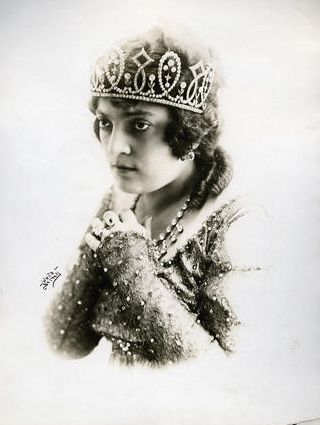
Luisa Villani was an Italian operatic soprano of American birth. She is best remembered for creating the role of Fiora in the world premiere of Italo Montemezzi's L'amore dei tre re at La Scala in 1913.

















